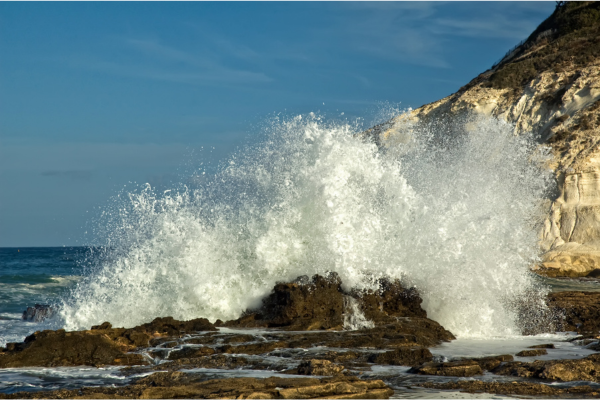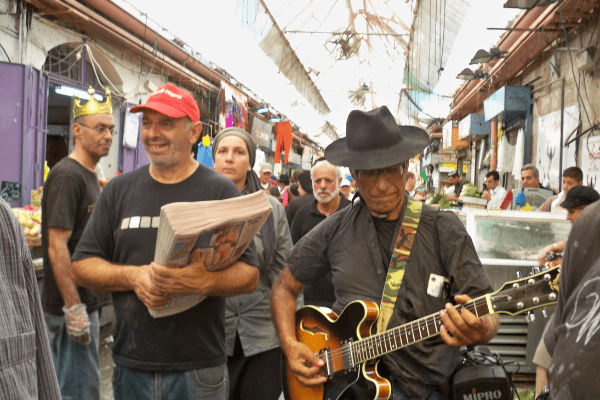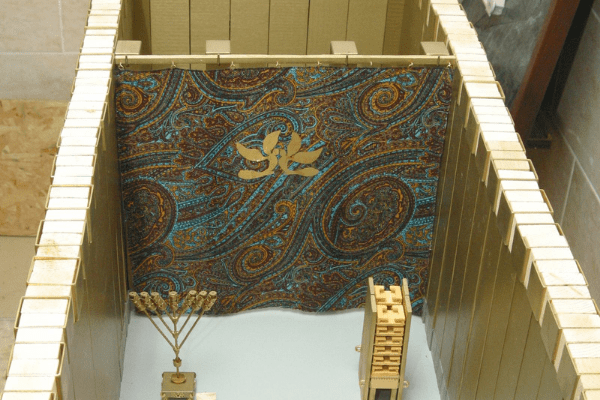
TORAH
NEVI'IM
KETUVIM
II - Chapter 5
Translation and Transliteration of
Listen to this chapter in Hebrew:
- Commentary
- Buy E-book
- Buy the Israel Bible
1When all the work that King Shlomo undertook for the House of Hashem was completed, Shlomo brought the things that his father David had consecrated—the silver, the gold, and the utensils—and deposited them in the treasury of the House of Hashem.
אוַתִּשְׁלַם כָּל־הַמְּלָאכָה אֲשֶׁר־עָשָׂה שְׁלֹמֹה לְבֵית יְהֹוָה וַיָּבֵא שְׁלֹמֹה אֶת־קָדְשֵׁי דָּוִיד אָבִיו וְאֶת־הַכֶּסֶף וְאֶת־הַזָּהָב וְאֶת־כָּל־הַכֵּלִים נָתַן בְּאֹצְרוֹת בֵּית הָאֱלֹהִים׃
2Then Shlomo convoked the elders of Yisrael—all the heads of the tribes and the ancestral chiefs of the Israelites—in Yerushalayim, to bring up the Aron Brit Hashem from the City of David, that is, Tzion.
באָז יַקְהֵיל שְׁלֹמֹה אֶת־זִקְנֵי יִשְׂרָאֵל וְאֶת־כָּל־רָאשֵׁי הַמַּטּוֹת נְשִׂיאֵי הָאָבוֹת לִבְנֵי יִשְׂרָאֵל אֶל־יְרוּשָׁלָ ִם לְהַעֲלוֹת אֶת־אֲרוֹן בְּרִית־יְהֹוָה מֵעִיר דָּוִיד הִיא צִיּוֹן׃
3All the men of Yisrael assembled before the king at the Feast, in the seventh month.
גוַיִּקָּהֲלוּ אֶל־הַמֶּלֶךְ כָּל־אִישׁ יִשְׂרָאֵל בֶּחָג הוּא הַחֹדֶשׁ הַשְּׁבִעִי׃
4When all the elders of Yisrael had come, the Leviim carried the Aron.
דוַיָּבֹאוּ כֹּל זִקְנֵי יִשְׂרָאֵל וַיִּשְׂאוּ הַלְוִיִּם אֶת־הָאָרוֹן׃
5They brought up the Aron and the Tent of Meeting and all the holy vessels that were in the Tent—the Levite Kohanim brought them up.
הוַיַּעֲלוּ אֶת־הָאָרוֹן וְאֶת־אֹהֶל מוֹעֵד וְאֶת־כָּל־כְּלֵי הַקֹּדֶשׁ אֲשֶׁר בָּאֹהֶל הֶעֱלוּ אֹתָם הַכֹּהֲנִים הַלְוִיִּם׃
6Meanwhile, King Shlomo and the whole community of Yisrael, who had gathered to him before the Aron, were sacrificing sheep and oxen in such abundance that they could not be numbered or counted.
ווְהַמֶּלֶךְ שְׁלֹמֹה וְכָל־עֲדַת יִשְׂרָאֵל הַנּוֹעָדִים עָלָיו לִפְנֵי הָאָרוֹן מְזַבְּחִים צֹאן וּבָקָר אֲשֶׁר לֹא־יִסָּפְרוּ וְלֹא יִמָּנוּ מֵרֹב׃
7The Kohanim brought the Aron Brit Hashem to its place in the inner Sanctuary of the House, in the Holy of Holies, beneath the wings of the cherubim;
זוַיָּבִיאוּ הַכֹּהֲנִים אֶת־אֲרוֹן בְּרִית־יְהֹוָה אֶל־מְקוֹמוֹ אֶל־דְּבִיר הַבַּיִת אֶל־קֹדֶשׁ הַקְּדָשִׁים אֶל־תַּחַת כַּנְפֵי הַכְּרוּבִים׃
8for the cherubim had their wings spread out over the place of the Aron so that the cherubim covered the Aron and its poles from above.
חוַיִּהְיוּ הַכְּרוּבִים פֹּרְשִׂים כְּנָפַיִם עַל־מְקוֹם הָאָרוֹן וַיְכַסּוּ הַכְּרוּבִים עַל־הָאָרוֹן וְעַל־בַּדָּיו מִלְמָעְלָה׃
9The poles projected beyond the Aron and the ends of the poles were visible from the front of the inner Sanctuary, but they could not be seen from the outside; and there they remain to this day.
טוַיַּאֲרִיכוּ הַבַּדִּים וַיֵּרָאוּ רָאשֵׁי הַבַּדִּים מִן־הָאָרוֹן עַל־פְּנֵי הַדְּבִיר וְלֹא יֵרָאוּ הַחוּצָה וַיְהִי־שָׁם עַד הַיּוֹם הַזֶּה׃
10There was nothing inside the Aron but the two tablets that Moshe placed [there] at Horeb, when Hashem made [a Covenant] with the Israelites after their departure from Egypt.
יאֵין בָּאָרוֹן רַק שְׁנֵי הַלֻּחוֹת אֲשֶׁר־נָתַן מֹשֶׁה בְּחֹרֵב אֲשֶׁר כָּרַת יְהֹוָה עִם־בְּנֵי יִשְׂרָאֵל בְּצֵאתָם מִמִּצְרָיִם׃
11When the Kohanim came out of the Sanctuary—all the Kohanim present had sanctified themselves, without keeping to the set divisions—
יאוַיְהִי בְּצֵאת הַכֹּהֲנִים מִן־הַקֹּדֶשׁ כִּי כָּל־הַכֹּהֲנִים הַנִּמְצְאִים הִתְקַדָּשׁוּ אֵין לִשְׁמוֹר לְמַחְלְקוֹת׃
12all the Levite singers, Asaf, Hayman, Yedutun, their sons and their brothers, dressed in fine linen, holding cymbals, harps, and lyres, were standing to the east of the mizbayach, and with them were 120 Kohanim who blew trumpets.
יבוְהַלְוִיִּם הַמְשֹׁרֲרִים לְכֻלָּם לְאָסָף לְהֵימָן לִידֻתוּן וְלִבְנֵיהֶם וְלַאֲחֵיהֶם מְלֻבָּשִׁים בּוּץ בִּמְצִלְתַּיִם וּבִנְבָלִים וְכִנֹּרוֹת עֹמְדִים מִזְרָח לַמִּזְבֵּחַ וְעִמָּהֶם כֹּהֲנִים לְמֵאָה וְעֶשְׂרִים מחצררים [מַחְצְרִים] בַּחֲצֹצְרוֹת׃
13The trumpeters and the singers joined in unison to praise and extol Hashem; and as the sound of the trumpets, cymbals, and other musical instruments, and the praise of Hashem, “For He is good, for His steadfast love is eternal,” grew louder, the House, the House of Hashem, was filled with a cloud.
יגוַיְהִי כְאֶחָד למחצצרים [לַמְחַצְּרִים] וְלַמְשֹׁרֲרִים לְהַשְׁמִיעַ קוֹל־אֶחָד לְהַלֵּל וּלְהֹדוֹת לַיהֹוָה וּכְהָרִים קוֹל בַּחֲצֹצְרוֹת וּבִמְצִלְתַּיִם וּבִכְלֵי הַשִּׁיר וּבְהַלֵּל לַיהֹוָה כִּי טוֹב כִּי לְעוֹלָם חַסְדּוֹ וְהַבַּיִת מָלֵא עָנָן בֵּית יְהֹוָה׃
14The Kohanim could not stay and perform the service because of the cloud, for the glory of Hashem filled the House of Hashem.
v'-lo ya-kh'-LU ha-ko-ha-NEEM la-a-MOD l'-sha-RAYT mi-p'-NAY he-a-NAN kee ma-LAY kh'-VOD a-do-NAI et BAYT ha-e-lo-HEEM
ידוְלֹא־יָכְלוּ הַכֹּהֲנִים לַעֲמוֹד לְשָׁרֵת מִפְּנֵי הֶעָנָן כִּי־מָלֵא כְבוֹד־יְהֹוָה אֶת־בֵּית הָאֱלֹהִים׃
5:14 For the glory of Hashem filled the house of Hashem
This description closely resembles that of the completion of the construction of the Mishkan: “Moshe could not enter the Tent of Meeting, because the cloud had settled upon it and the presence of Hashem filled the Mishkan” (Exodus 40:35). In both cases, a resting place for the Lord is built in the heart of the nation, and God’s glory comes down to reside within it. In the desert, the Mishkan rests at the center of the Israelite camp. Here, the Beit Hamikdash is built on hallowed ground in the city of Yerushalayim. The concentration of His presence is a reminder that Hashem continuously dwells among His people.







